Movie Review
 |
 |
 |
 |
 |
 |
 |
Are Dinosaurs Equal to Humans?
Elizabeth A. Lozowski
The most recent addition to the Jurassic World series, Jurassic World: Fallen Kingdom, continues the general science fiction conundrum of the first Jurassic World movie: whether or not genetically engineered dinosaurs should live on Earth.
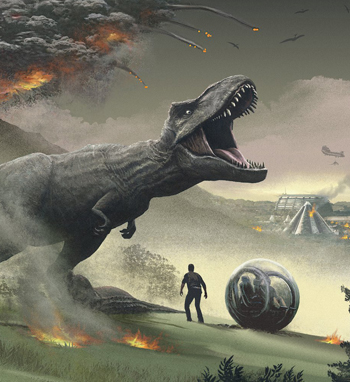 The Jurassic Park of the first movie has been abandoned due to the violence of the dinosaurs; it still exists, however, on an island where a volcano is ready to erupt at any minute.
The Jurassic Park of the first movie has been abandoned due to the violence of the dinosaurs; it still exists, however, on an island where a volcano is ready to erupt at any minute.
The dinosaurs that still live on the island would be naturally killed by the eruption, thus ending the dangerous threat they pose to mankind. So, rationally speaking, the eruption is something to encourage, not prevent.
The threat these surrealistic creatures would pose to man's existence has been addressed in the four previous films in the franchise. However, despite this obvious menace to mankind, the plot of this film revolves around the efforts of an animal rights activist group led by Owen and Claire to save the dinosaurs.
An imaginary Senator Sherwood sums up the problem in a question he asks at the opening of the film: “The US Senate has convened a special committee to answer a grave moral question. Do dinosaurs deserve the same protections given to other endangered species or should they be left to die?” This is a hypothetical question that deserves further analysis.
The rights of dinosaurs
Should dinosaurs that have been genetically created be allowed to live, although their presence leads to many deaths? Generally speaking, endangered species should be preserved. Men have an obligation to protect the environment and care for God’s creatures, providing what is reasonable to prevent the extinction of a species beneficial to mankind.
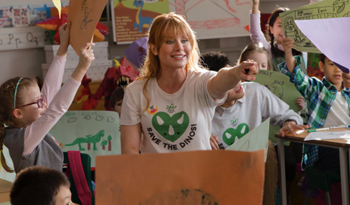 However, if there is a choice between a species of animal and the life of a human, the animals should be sacrificed in order to save the human, for humans are rational beings with a soul and have more dignity than animals.
However, if there is a choice between a species of animal and the life of a human, the animals should be sacrificed in order to save the human, for humans are rational beings with a soul and have more dignity than animals.
Moreover, the question becomes more problematic because the imaginary dinosaurs at Jurassic Park were not created by God, but by man. First, this would pretend that man is a Creator equal to God. This is an affront to God, the rightful Creator of every living thing. Second, it ignores the fact that whatever goes against the natural order created by God sooner or later has bad consequences.
The message of this film is that genetically engineered beings would have rights and deserve to live at the expense of creatures created by God.
According to the Catholic doctrine, animals do not have rights. Only beings with a spiritual soul are the object of rights (see here and here). We should not mistreat an animal because everything in Creation is a likeness of God and to mistreat an animal is unwise; but not because the animal has rights like a man.
This is even more the case regarding possible animals genetically engineered by man, for they would not be God’s creatures. Further, these dinosaurs would cause destruction and death wherever they would go. It is not hard to come to the conclusion that those dinosaurs must be killed for the sake of mankind’s common good.
Feminism
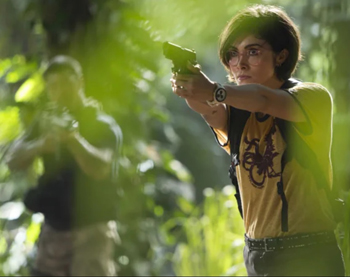 As in most of the modern films, we find feminism. One of the characters, Zia, is a rude, spontaneous, headstrong woman.
As in most of the modern films, we find feminism. One of the characters, Zia, is a rude, spontaneous, headstrong woman.
She is a doctor who refuses to listen to male authorities and belittles her male colleague. She is so obnoxious that I was not surprised to learn that she is supposed to be lesbian.For, after all, that is the final aim of feminism.
On the other hand, Zia’s male colleague, Franklin, acts in many ways like a woman. He is hypersensitive to his surroundings, screams like a girl when he faces terror, and meekly follows the women in the film without thinking for himself. Instead of the man leading and showing virile courage, the lesbian character takes his place.
Monsters & clones
The film delves deeper into the Revolution than its obsession with feminism and animal rights: It borders on the diabolical by encouraging affection for monsters.
There has been a tendency in recent years to present monsters as normal creatures, making them seem misunderstood by men and friendly toward them: e.g. How to Train Your Dragon, Maleficent, Kong: Skull Island and Godzilla, to name a few films.
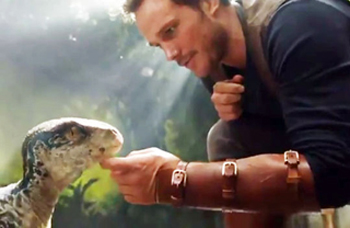 It is a perversion of the sense of good and evil that destroys the moral conscience of children and adults alike. It trains the mind to love what is evil and to hate what is good and beautiful.
Jurassic World does this in a sentimental and strange way. The viewer is coached to sympathize with the dinosaurs, even the most vicious ones. The characters on screen weep when a dinosaur is hurt or injured, but shed no tears when a human is killed by a dinosaur.
It is a perversion of the sense of good and evil that destroys the moral conscience of children and adults alike. It trains the mind to love what is evil and to hate what is good and beautiful.
Jurassic World does this in a sentimental and strange way. The viewer is coached to sympathize with the dinosaurs, even the most vicious ones. The characters on screen weep when a dinosaur is hurt or injured, but shed no tears when a human is killed by a dinosaur.
In order to make the dinosaurs likeable, they are made to act like pets. For example, the trainer Owen has a sentimental attachment to Blue, a Raptor dinosaur that is the most "intelligent" and appears more as a lovable puppy than a lizard. With this the viewer is led to open his heart to the dinosaurs. I believe it is not natural for humans to love dinosaurs.
This craze to turn monsters into pets or animals that are just misunderstood has become mainstream. One day, when I was substitute teaching for a third grade class, the children were reading an article on wolves.
Instead of describing the habits of wolves – what they eat, where they live, and so forth – the article described how wolves have been “abused” and “misunderstood” all of these years. Pioneers made up myths about wolves eating children and told these scary stories to make their children afraid of wolves, the article alleged.
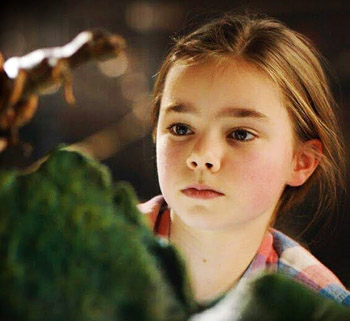 These “myths,” it continued, made the pioneers needlessly kill the wolves because the wolves never actually harmed humans. The wolves were presented as victims of the bloodthirsty humans and children were taught that they should not be afraid of the predators. Such lies are what children are learning today.
These “myths,” it continued, made the pioneers needlessly kill the wolves because the wolves never actually harmed humans. The wolves were presented as victims of the bloodthirsty humans and children were taught that they should not be afraid of the predators. Such lies are what children are learning today.
The truth is that predators never lose their instinct to kill and can never fully be tamed or trusted. Monsters, even more than normal predators, are always dangerous. Movies like Jurassic World teach exactly the opposite: Monsters can be our friends.
But perhaps even more terrifying than an attempt to make monsters appear normal is this movie’s attempt to present cloning as normal. Maisie, a little girl who is supposedly the granddaughter of the inventor of Jurassic Park, stays at the house where all of the dinosaurs are brought from the island. Later on in the film, however, we find out that she is actually a clone of the inventor’s daughter. No one in the film objects to this. What is abnormal and even monstrous becomes normal in Jurassic Park.
Sentimentalism
At the end of the movie, the dinosaurs are trapped in a mansion with toxic gas filling their lungs. Claire wants to set them free because of her affection for them, but Owen stops her.
At this point we can see why in real life women should not be in charge of making decisions. Women are naturally moved by their feelings and affections and easily succumb to their emotions. For this reason, men should lead in the social order, because they normally make rational decisions that will benefit the common good. Unfortunately, in today's effeminate society, the tendency to make sentimental decisions is the rule even for many men.
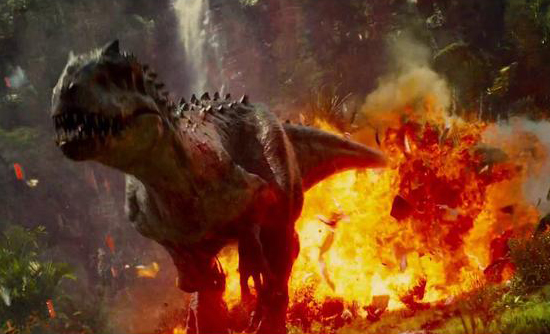 Every irrational decision made in this movie was made by a woman. Animal rights activists groups, led foremost by women, are sad that the dinosaurs would die and decide to save them.
Every irrational decision made in this movie was made by a woman. Animal rights activists groups, led foremost by women, are sad that the dinosaurs would die and decide to save them.
In the last scene, Maisie (the clone) decides to set the dinosaurs free, even though she knows that they will cause great harm to mankind when set loose in the world. Her reason for doing so is “I had to. They’re alive ... like me.” This implies that every living creature – even the possibly genetically engineered – would deserve to live. Man and animals are equal. The UNESCO goal is achieved.
The two human main characters, Owen and Claire, accept Maise's action because of their affection for the man-made dinosaurs and the clone. And so, the genetically engineered monsters are set free into the world without a thought to the disastrous effects. The lesson for the audience is that those man-made creatures have as much a right to live as the humans who have been created by God.
This movie leaves the viewer with an uncomfortable feeling that the Secret Forces are trying to prepare the world to accept not only equal rights for animals but also genetically engineered monsters and clones.
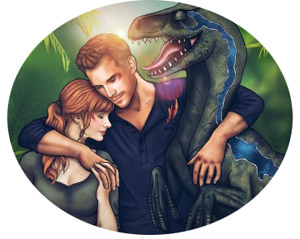 The last scenes show the dinosaurs ravaging the world, causing terror. Amid all of this chaos, Claire and Owen and the clone drive off together, looking at each other with concerned faces but without any regret for what they have done. They are willing to accept the new order of the world.
The last scenes show the dinosaurs ravaging the world, causing terror. Amid all of this chaos, Claire and Owen and the clone drive off together, looking at each other with concerned faces but without any regret for what they have done. They are willing to accept the new order of the world.
And we are left with the words of Dr. Ian Malcolm, who appears once at the beginning of the film and again at the end to give his verdict on the engineered dinosaurs: “Humans and dinosaurs are now going to be forced to coexist. These creatures were here before us. And if we’re not careful, they’re going to be here after. We’re going to have to adjust to new threats that we can’t imagine. We’ve entered a new era.”
What will be this new era? It will be the end of Christian Civilization. The new era will be the “Jurassic World,” a world in which we will have to live with monsters created by man. Will this not be the Devil’s kingdom?


Man or dinosaur conundrum: Dinosaur wins in the Fallen Kingdom
The dinosaurs that still live on the island would be naturally killed by the eruption, thus ending the dangerous threat they pose to mankind. So, rationally speaking, the eruption is something to encourage, not prevent.
The threat these surrealistic creatures would pose to man's existence has been addressed in the four previous films in the franchise. However, despite this obvious menace to mankind, the plot of this film revolves around the efforts of an animal rights activist group led by Owen and Claire to save the dinosaurs.
An imaginary Senator Sherwood sums up the problem in a question he asks at the opening of the film: “The US Senate has convened a special committee to answer a grave moral question. Do dinosaurs deserve the same protections given to other endangered species or should they be left to die?” This is a hypothetical question that deserves further analysis.
The rights of dinosaurs
Should dinosaurs that have been genetically created be allowed to live, although their presence leads to many deaths? Generally speaking, endangered species should be preserved. Men have an obligation to protect the environment and care for God’s creatures, providing what is reasonable to prevent the extinction of a species beneficial to mankind.

Claire teaches children about the rights of dinosaurs
Moreover, the question becomes more problematic because the imaginary dinosaurs at Jurassic Park were not created by God, but by man. First, this would pretend that man is a Creator equal to God. This is an affront to God, the rightful Creator of every living thing. Second, it ignores the fact that whatever goes against the natural order created by God sooner or later has bad consequences.
The message of this film is that genetically engineered beings would have rights and deserve to live at the expense of creatures created by God.
According to the Catholic doctrine, animals do not have rights. Only beings with a spiritual soul are the object of rights (see here and here). We should not mistreat an animal because everything in Creation is a likeness of God and to mistreat an animal is unwise; but not because the animal has rights like a man.
This is even more the case regarding possible animals genetically engineered by man, for they would not be God’s creatures. Further, these dinosaurs would cause destruction and death wherever they would go. It is not hard to come to the conclusion that those dinosaurs must be killed for the sake of mankind’s common good.
Feminism

Zia the feminist fights and tries to act like a man
She is a doctor who refuses to listen to male authorities and belittles her male colleague. She is so obnoxious that I was not surprised to learn that she is supposed to be lesbian.For, after all, that is the final aim of feminism.
On the other hand, Zia’s male colleague, Franklin, acts in many ways like a woman. He is hypersensitive to his surroundings, screams like a girl when he faces terror, and meekly follows the women in the film without thinking for himself. Instead of the man leading and showing virile courage, the lesbian character takes his place.
Monsters & clones
The film delves deeper into the Revolution than its obsession with feminism and animal rights: It borders on the diabolical by encouraging affection for monsters.
There has been a tendency in recent years to present monsters as normal creatures, making them seem misunderstood by men and friendly toward them: e.g. How to Train Your Dragon, Maleficent, Kong: Skull Island and Godzilla, to name a few films.

Presenting predator monsters as ‘lovable’ pets
In order to make the dinosaurs likeable, they are made to act like pets. For example, the trainer Owen has a sentimental attachment to Blue, a Raptor dinosaur that is the most "intelligent" and appears more as a lovable puppy than a lizard. With this the viewer is led to open his heart to the dinosaurs. I believe it is not natural for humans to love dinosaurs.
This craze to turn monsters into pets or animals that are just misunderstood has become mainstream. One day, when I was substitute teaching for a third grade class, the children were reading an article on wolves.
Instead of describing the habits of wolves – what they eat, where they live, and so forth – the article described how wolves have been “abused” and “misunderstood” all of these years. Pioneers made up myths about wolves eating children and told these scary stories to make their children afraid of wolves, the article alleged.

We must also accept Maisie, a human clone
The truth is that predators never lose their instinct to kill and can never fully be tamed or trusted. Monsters, even more than normal predators, are always dangerous. Movies like Jurassic World teach exactly the opposite: Monsters can be our friends.
But perhaps even more terrifying than an attempt to make monsters appear normal is this movie’s attempt to present cloning as normal. Maisie, a little girl who is supposedly the granddaughter of the inventor of Jurassic Park, stays at the house where all of the dinosaurs are brought from the island. Later on in the film, however, we find out that she is actually a clone of the inventor’s daughter. No one in the film objects to this. What is abnormal and even monstrous becomes normal in Jurassic Park.
Sentimentalism
At the end of the movie, the dinosaurs are trapped in a mansion with toxic gas filling their lungs. Claire wants to set them free because of her affection for them, but Owen stops her.
At this point we can see why in real life women should not be in charge of making decisions. Women are naturally moved by their feelings and affections and easily succumb to their emotions. For this reason, men should lead in the social order, because they normally make rational decisions that will benefit the common good. Unfortunately, in today's effeminate society, the tendency to make sentimental decisions is the rule even for many men.

A stupid decision by Maisie,
to let the dinosaurs loose on earth
In the last scene, Maisie (the clone) decides to set the dinosaurs free, even though she knows that they will cause great harm to mankind when set loose in the world. Her reason for doing so is “I had to. They’re alive ... like me.” This implies that every living creature – even the possibly genetically engineered – would deserve to live. Man and animals are equal. The UNESCO goal is achieved.
The two human main characters, Owen and Claire, accept Maise's action because of their affection for the man-made dinosaurs and the clone. And so, the genetically engineered monsters are set free into the world without a thought to the disastrous effects. The lesson for the audience is that those man-made creatures have as much a right to live as the humans who have been created by God.
This movie leaves the viewer with an uncomfortable feeling that the Secret Forces are trying to prepare the world to accept not only equal rights for animals but also genetically engineered monsters and clones.

Conclusion: ‘We have entered a new era’ where humans and monsters have equal rights
And we are left with the words of Dr. Ian Malcolm, who appears once at the beginning of the film and again at the end to give his verdict on the engineered dinosaurs: “Humans and dinosaurs are now going to be forced to coexist. These creatures were here before us. And if we’re not careful, they’re going to be here after. We’re going to have to adjust to new threats that we can’t imagine. We’ve entered a new era.”
What will be this new era? It will be the end of Christian Civilization. The new era will be the “Jurassic World,” a world in which we will have to live with monsters created by man. Will this not be the Devil’s kingdom?

Posted August 16, 2019
______________________
______________________





